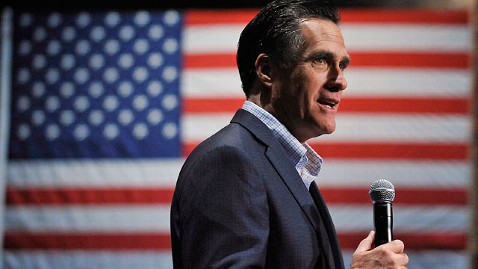Romney's Immigration Stance Alienates Some Latino Mormons

(Image Credit: Rainier Ehrhardt/AP Photo)
Mitt Romney spent last weekend in the Mormon hotbed of Salt Lake City, Utah, where he married wife Ann decades ago. But while he has so far enjoyed widespread support among his fellow Mormons in the campaign for the Republican presidential nomination, a small but vocal faction of Latino Mormons wants to see Romney defeated.
The former Massachusetts governor's controversial stance on immigration has alienated some Latino Mormons. In all, Latino Mormons make up 7 percent of Mormons in this country, so their potential influence on Romney's chances of winning both the nomination and the presidency is limited.
In Nevada, for instance, a state with a large population of Latinos and Mormons, Romney cruised to a victory in the caucuses earlier this month, bolstered by the fact that 26 percent of caucus participants were Mormon, and 91 percent of them voted for him.
But the frustration that some Latino Mormons feel is illustrative of the polarizing nature of Romney's immigration policy among Latinos nationwide, and the effect that could have on Romney's chances of winning the White House this year. In the run-up to the Iowa caucuses in January, Romney said that as president, he would veto the DREAM Act, a bill that would provide a path to citizenship for some undocumented children of immigrants who attend college or serve in the military.
The fallout from Latinos was immediate.
When asked the next day whether he would back Romney, Juan Rodriguez, a Republican businessman in Des Moines, didn't hesitate in his response.
"I wouldn't vote for Romney because he doesn't support immigration reform or the DREAM Act," he said. "My business depends on Hispanics basically, and if there's no immigration reform, we are going to be very affected. Not just me, but all the businesses that, like us, depend on the Latino community."
The next week in New Hampshire, Esteban and Selma Lopez, a Latino couple in Goffstown who will vote for the first time in the general election this fall, shared a similar sentiment.
"I work in education and I know first-hand how important the DREAM Act is for Latino youth, for kids who are in this country without having taken part in the decision to come here," Lopez said. "The short answer is I wouldn't vote for Romney."
Even the country's largest Latino Republican group - Somos Republicans - said it would oppose Romney because of his immigration policies, deciding to back rival Newt Gingrich instead.
What makes the opposition to Romney of some Latino Mormons different is that their disapproval of his immigration stance stems not from business or professional reasons, but rather from religious ones.
Some Latino Mormons such as Honduran-born Antonella Cecilia Packard believe Romney has betrayed a basic Mormon belief of protecting immigrants, according to a story by the Associated Press' Russell Contreras.
"A lot of us aren't supporting him because of his stance against immigrants," she told Contreras.
Latino Mormons, the AP story noted, cite immigration stories in the Book of Mormon and some recent statements by the Church of Jesus Christ of Latter-day Saints against various policies that target immigrants. In addition, as AP reported, they see Romney as a hypocrite because his own great-grandfather Miles fled to Mexico after an anti-polygamist law was passed in 1882.
If Latinos - Mormons or otherwise - go against Romney, that could pose a real threat to his chances of securing the GOP nomination and, later this fall, the White House. In Arizona, along with Michigan, the next state to vote in the primary on Feb. 28, Latinos make up 18 percent of the state's eligible voters.
Nationwide, meanwhile, Latinos make up the nation's fastest-growing voting bloc, with an estimated 12.2 million Latinos set to vote in the general election. While Romney's immigration stance might have helped him with some conservatives, it might do him an equal - if not greater - amount of harm with Latinos across the country, even among those who share his faith.
Matthew Jaffe is covering the 2012 campaign for ABC News and Univision.